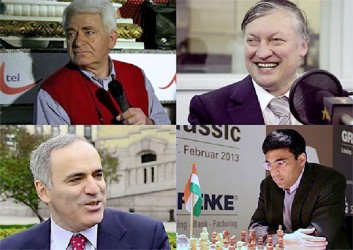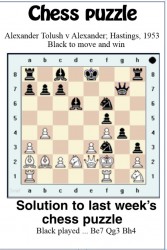Magnus Carlsen, the 23-year-old Norwegian grandmaster and World Chess Champion who has demonstrated an extraordinary power over the finest chess players on the planet, has launched a chess playing app that allows players all around the world to challenge him. The game is built up by a computer that simulates Carlsen’s chess play at different ages from 5-23 and allows participants to collect points to try and qualify for a chance to compete against the World Champion himself live.
Carlsen blasted to prominence when he became a grandmaster at the age of 13 years and 148 days in 2004, and he has remained in the spotlight ever since. At present, Carlsen is a widely publicised fashion model and a successful businessman. Popular for his opening repertoire, Carlsen engaged ardent chess fan and Microsoft’s Chairman Bill Gates in a speed chess game following his win over Vishy Anand for the World Championship chess title last year. Regrettably, the Microsoft billionaire lost. He was featured on Time magazine’s cover and Time pronounced him one of the world’s most influential people of 2013.
Giving users the option to play against Carlsen at all levels, the app is said to accommodate players from absolute beginners to world champion contenders. The simulation of Carlsen’s way of playing at 19 different ages is based on actual games and openings he has played throughout his career. When playing the games, you also get access to training videos created by Carlsen himself. The World Champion has been quoted as saying: “I hope that they can learn from some of my favourite tactics.” Some time before the launching of the app, the product was put through the ultimate test: facing the real Magnus Carlsen against the simulated younger version of himself. Carlsen admitted that he had quite a bold style, after being asked about how it was to play against himself at age 12. Incidentally, when Carlsen played three games against ‘himself’’ at age 23, he drew twice, and the last one, well, he lost that.

The company behind the game, Play Magnus AS, hopes it can be a stepping stone to future chess product development. Already the app is enjoying wide appeal, and the creators of the product are hoping that this would become global. The app is called ‘Play Magnus’ and is available worldwide .
The World Junior Chess Championship is happening now in Pune, India, and concludes on October 20. An impressive array of titled players is participating in the tournament comprising 18 grandmasters and 20 international masters. The best players in the world below the age of 20 – 136 to be exact – are competing for this elite title, and those who win it go far in having successful chess careers. The World Junior entitles the winner of the tournament to be bestowed with the elusive grandmaster title. But of the 52 World Juniors which have been held to date, only four players have captured the Holy Grail of Chess, the World Championship title. The highlight of the first round of the tournament was the victory of a 10-year-old Indian schoolboy who defeated a Swedish international master (2420).
There is nothing to report or discuss in relation to the local chess scene. I remain optimistic however, that plans are in the making for the hosting of the National Junior Championship which is scheduled to be played during the month of October. I urge our junior chess players, therefore, to continue their practice in preparation for the big occasion.
Chess games
The following games were played at the World Junior Championship in Pune, India. The tournament is ongoing, and ends on October 20.
Lu v Gagare
White: Shanglei Lu
Black: Shardul Gagare
1. e4 c6 2. Nc3 d5 3. d4 g6 4. Nf3 Bg7 5. h3 dxe4 6. Nxe4 Nd7 7. Bc4 Ngf6 8. Nxf6+ Nxf6 9. O-O O-O 10. Re1 Qc7 11. Ne5 Nd5 12. Bb3 b5 13. c3 a5 14. a4 Bb7 15. Bxd5 cxd5 16. axb5 f6 17. b6 Qd6 18. Nd3 e5 19. Nc5 Rf7 20. Qb3 Qc6 21. Be3 e4 22. Ra4 f5 23. c4 f4 24. cxd5 Qc8 25. d6 fxe3 26. fxe3 Qf5 27. Nxb7 Qf2+ 28. Kh2 Qxe1 29. d7 Bf6 30. Nd6 Rf8 31. Ra1 Qxa1 32. Nxf7 Qe1 33. b7 a4 34. Qe6 Bh4 35. Nd8+ Kg7 36. b8=Q Bf2 37. Qe7+ Kg8 38. Qf7+ 1-0.
Jeevitesh v Ider
White: Sai Agni Jeevitesh, J
Black: Borya Ider
1. d4 Nf6 2. Nf3 e6 3. e3 d5 4. Bd3 c5 5. b3 Nc6 6. O-O Bd6 7. Bb2 O-O 8. Ne5 Qc7 9. f4 cxd4 10. exd4 Nb4 11. Nc3 Nxd3 12. Qxd3 a6 13. a4 Bd7 14. Rf3 0-1.
White: Sunilduth Lyna, Narayanan
Black: Filippos Stamos
1. d4 Nf6 2. c4 e6 3. Nf3 Bb4+ 4. Nbd2 d5 5. Qa4+ Nc6 6. e3 O-O 7. a3 Be7 8. Qc2 a5 9. b3 Nb8 10. Bb2 Nbd7 11. Bd3 b6 12. cxd5 exd5 13. Ne5 Bd6 14. O-O Qe8 15. Nxd7 Bxd7 16. e4 dxe4 17. Nxe4 Qd8 18. Nxd6 cxd6 19. d5 1-0.
Duda v Prince
White: Jan-Krzysztof Duda
Black: Bajaj Prince
1. e4 c5 2. Nf3 e6 3. d4 cxd4 4. Nxd4 Nc6 5. Nb5 d6 6. c4 Nf6 7. N1c3 a6 8. Na3 Be7 9. Be2 O-O 10. O-O b6 11. Be3 Bb7 12. Qb3 Nd7 13. Rfd1 Nc5 14. Qc2 Bf6 15. Rac1 Qe7 16. Nab1 Nb4 17. Qd2 Rad8 18. Bf1 d5 19. Nxd5 Nxd5 20. exd5 exd5 21. cxd5 Bxd5 22. Qb4 Bxa2 23. Nc3 Be6 24. Qxb6 Nb3 25. Rb1 a5 26. Qb5 Qb4 27. Nd5 Bxd5 28. Rxd5 Qxb5 29. Rxb5 Nd2 30. Rc1 Nxf1 31. Kxf1 Rb8 32. Rxb8 Rxb8 33. Ba7 Rd8 34. b3 h6 35. Ke2 Rd7 36. Bb6 Rb7 37. Rc6 Rb8 38. Kd2 Ra8 39. Rc2 Rb8 40. Bxa5 Rxb3 41. Bc3 Bxc3+ 1/2-1/2.









